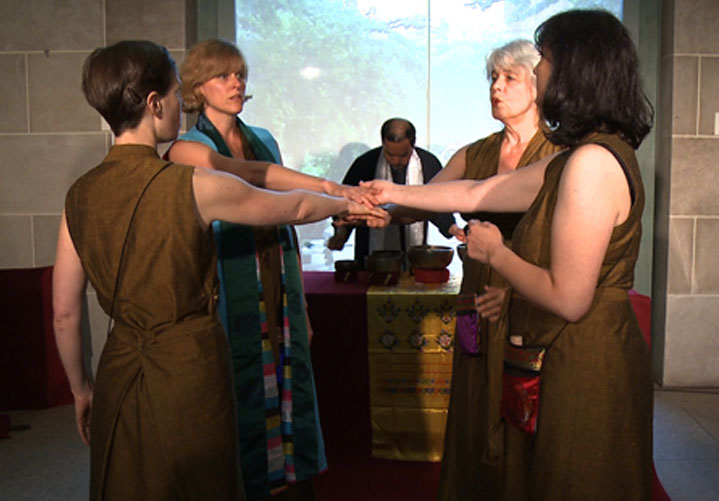

Tapestry, the Boston-based women’s ensemble, enchanted a full audience in the Dorsky Museum on Thursday, April 14.
The quartet included Laurie Monahan, Cristi Catt, Daniela ToŠić and Diana Brewer, a singer and baroque string player. The accomplished singers portrayed several touching stories through song, but their performance of “The White Rooster: A Tale of Compassion,” was the most anticipated piece of the night.
Stephen Kitsakos, an esteemed member from the Theatre Arts department, wrote the libretto for “The White Rooster,” composed by his long-time friend and world-renowned composer Sheila Silver.
“The White Rooster” tells the story of four Buddhist nuns who look for help and a way to entertain their fifth sister who sustained a gunshot wound. The story becomes a play within a play, and tells a tale of compassion, respect and the impermanence of life.
Kitsakos was pleased at the large number of students who attended the performance.
“It’s not something I think they’d normally be attracted to,” said Kitsakos.
Students recognized the universal message of the piece, but still appreciated the artistic talents of the singers and their ability to convey the emotions of the songs through their physical expressions.
“The music told a story,” said second-year theatre major Allyson Farzetta. “A story I feel is relatable to all cultures; it’s timeless.”
Kitsakos described creation and appeal of “The White Rooster.”
The piece was commissioned by the Freer Gallery of Art and the Arthur M. Sackler Gallery of the Smithsonian Institution. The dramatic cantata debuted as part of the Asian art series, “In the Realm of the Buddha.” The women of Tapestry specialize in this type of straight tone chant and the piece was written specifically for them. Percussionist Takaaki Masuko accompanies the Tapestry singers during their performances of “The White Rooster.”
Kitsakos and Silver said they were appalled by the mistreatment of Buddhist monks and nuns, and wanted to share their story, “in a way that is palatable to an audience,” said Kitsakos. While writing the libretto for “The White Rooster”, Kitsakos learned about Buddhist philosophy and the history of Tibet and discovered the attraction Buddhism holds for many people in the 21st century.
“It’s a way of looking at life through a different lens. It’s comforting and enlightening,” said Kitsakos.
According to Kitsakos, the two fundamental ideas of “The White Rooster” are transience and compassion. Life is impermanent and we should not attach ourselves to it or to material possessions.
“If we just honor compassion, we can elevate ourselves,” said Kitsakos during the conversation before the performance.
Kitsakos reiterated the main message conveyed by the story of “The White Rooster,” “Everything is changing from moment to moment. Nothing can remain unchanged. There is nothing to hold onto. Do not attach.”
